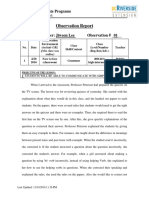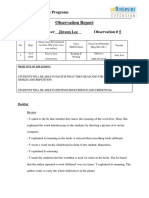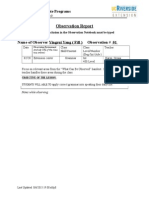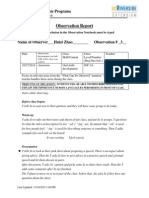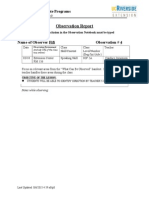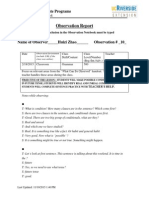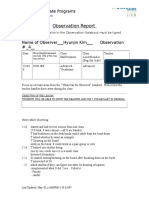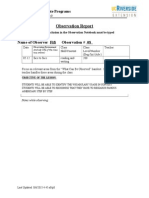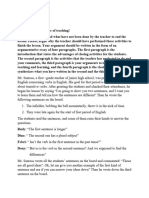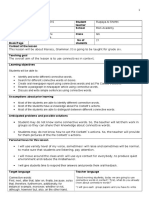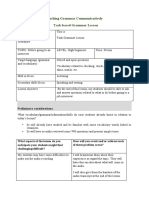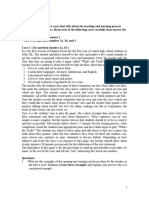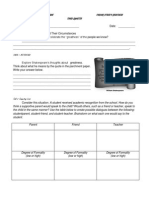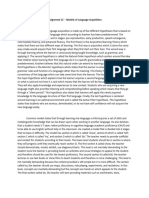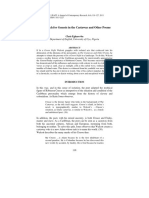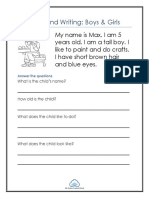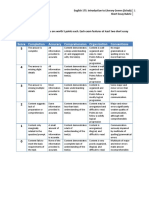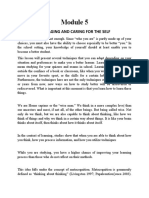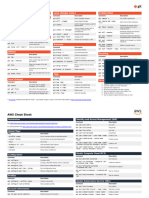2 F May 4th 2016
2 F May 4th 2016
Uploaded by
api-338054865Copyright:
Available Formats
2 F May 4th 2016
2 F May 4th 2016
Uploaded by
api-338054865Original Title
Copyright
Available Formats
Share this document
Did you find this document useful?
Is this content inappropriate?
Copyright:
Available Formats
2 F May 4th 2016
2 F May 4th 2016
Uploaded by
api-338054865Copyright:
Available Formats
TESOL Certificate Programs
Observation Notebook
Observation Report
Name of Observer: Jiweon Lee
No.
Date
Observation
Environment
(include URL if
the class was
online)
5/4
2016
Face to face
(classroom)
Observation # _02__
Class Skill/Content
Class
Level/Number
(Beg./Int./Adv.)
Teacher
Reading & Writing
300(342)
low intermediate
Robb
Hughes
OBJECTIVE OF THE LESSON:
1. STUDENTS WILL BE ABLE TO BUILD VOCABULARIES THROUGH
STUDYING SUFFIXES.
2. STUDENTS WILL BE ABLE TO IDENTIFY VOCABULARIES THROUGH
STUDYING SUFFIXES.
Before the class started off, the T had prepared a Microsoft Word document. T
introduced the observer to students. He said that today there is an observer, Jiweon. Then,
he started his class.
The T talked to the Ss to pull out their handout. Then he read a question sentence
in the paper. During his reading, he stressed the word suffix. He asked to Ss what it
means, and the Ss answered his question. He gave feedback on these answers: he
explained the word 'Persistence' as an example. The T spoke 'Persistence' again, and the
Ss repeated after him. The T corrected their pronunciations: he stressed the /r/ sound in
the word 'Persistence'. He said the suffix of 'Persistence', '-ence' and gave another suffix 'ance'. Next he gave information about the meaning of 'Persistence'. Then, he moved on to
quizzes. To solve the quiz, he demonstrated how to solve it. First, he said the function of
'Her' is an adjective-noun, typing the word on screen. He gave three minutes to work on
Last Updated: 11/13/2016 11:23 PM
TESOL Certificate Programs
Observation Notebook
those quizzes. The Ss could work using the packet given in the class. While the Ss solved
the question, he notified how much time was remaining. After three minutes, he asked the
Ss to share their answers with their partner. He made several pairs to do it. When the Ss
spoke their own language, he said that they should speak English to share it. The T
started his class by asking the Ss: what kind of word could be the answer to question
number one. The Ss replied in groups and the T added more information. He went
through the questions: First, focus on the form of the words. Second, he explained the
meaning of the words. When he did so, he searched on an online dictionary and let the Ss
listen the pronunciations of the words, or he explained the meaning using easy
vocabulary words. Also he mentioned 'Voca-block', which was in the packet of class
materials. He asked the Ss to write down some vocabulary words when they came across
words that they didn't know the meaning. He pointed out the right usage of the words'
tenses. Moreover, he mentioned some words that were similar to words in the handout.
For example, when he taught the word 'Adulthood', he compared it with 'neighborhood',
explaining the suffix '-hood'. He gave few minutes for each question to be solved with
their partner. He repeated this method until they went through all of the questions in the
paper. When they started to use the textbook, he read the grammar section to the Ss, and
he asked the Ss to underline five words that they studied.
After that, he asked the Ss to hand in their homework. Most of the Ss submitted,
but there were two students who didn't submit it. He explained to them that there would
be a deduction of ten points for being late. After checking it, the T asked the Ss to give
their homework to their partner, and circle every single past tense verbs in the homework.
When the Ss finished it, he told them to look carefully whether their past tense verbs
Last Updated: 11/13/2016 11:23 PM
TESOL Certificate Programs
Observation Notebook
were correct. He gave one minute to the Ss for correcting what their partner checked
before submitting it. He mentioned the Ss should check their emails every day. The class
was finished.
What did you learn about teaching or learning from this lesson? Discuss your
observation focus, and the theory you have studied in your TESOL classes. Consider
the three levels of teacher reflection (surface, pedagogical, critical). (100-200 words)
I focused on how he made the students feel comfortable. When I took his class
before the observation, I could feel relaxed even while I was learning. I was curious
about the reason why I didn't feel stressed from learning. I found two reasons. First he led
his class with confidence and I think that came from his materials. He prepared what he
would teach in his class perfectly and simply followed it. Second, he used humor to relax
the students. When a student made a mistake, he converted the mistake to humor. The
student didn't feel bad but he was laughing and the class kept going.
What activities/techniques from this class do you want to remember for your own
teaching practice? Discuss specific ways in which you could apply the techniques and
methods you saw. Discuss your future teaching environment and your students needs
and goals. (100-200 words)
I want to remember how to teach the lower level students. After observation, I
asked to the teacher: why did you do first step was identifying and then correct second. I
thought that just going to the second step was faster. However, he explained to me that if
he taught the level 500 students, he could do that, but he taught the level 300 students, so
Last Updated: 11/13/2016 11:23 PM
TESOL Certificate Programs
Observation Notebook
he thought that they needed to have time to identify which word is a subject or a verb. I
think this technique- to consider the level of the students and have different steps to teach
them is very important. In my future classes, I can use this method to teach students of
varying levels together in a class.
Last Updated: 11/13/2016 11:23 PM
You might also like
- Observation Report: TESOL Certificate ProgramsDocument6 pagesObservation Report: TESOL Certificate Programsapi-338054865No ratings yet
- 4 Observation ReportDocument4 pages4 Observation Reportapi-338054865No ratings yet
- Observation Report 5 Daniel Shin Ls SP Johanna KimDocument5 pagesObservation Report 5 Daniel Shin Ls SP Johanna Kimapi-299925043No ratings yet
- Observation Report 2Document12 pagesObservation Report 2api-341034802No ratings yet
- 1 F April 20th 2016Document6 pages1 F April 20th 2016api-338054865No ratings yet
- Observation Report 3 Daniel Shin Ls SP KarenDocument4 pagesObservation Report 3 Daniel Shin Ls SP Karenapi-299925043No ratings yet
- 5 Observation ReportDocument5 pages5 Observation Reportapi-338054865No ratings yet
- Observation NotebookDocument35 pagesObservation Notebookapi-300213798No ratings yet
- Observation 2Document4 pagesObservation 2api-300213798No ratings yet
- Observation 4Document4 pagesObservation 4api-300213798No ratings yet
- Observation Report: TESOL Certificate ProgramsDocument4 pagesObservation Report: TESOL Certificate Programsapi-291611819No ratings yet
- Observation 3Document4 pagesObservation 3api-300213798No ratings yet
- Obs2 ExpDocument3 pagesObs2 Expapi-320101338No ratings yet
- Observation1 1Document5 pagesObservation1 1api-340746295No ratings yet
- Observation Report: TESOL Certificate ProgramsDocument3 pagesObservation Report: TESOL Certificate Programsapi-291611819No ratings yet
- Observation Report 10Document4 pagesObservation Report 10api-300213798No ratings yet
- Observation 1Document4 pagesObservation 1api-300213798No ratings yet
- Obs 4 ExpDocument3 pagesObs 4 Expapi-320101338No ratings yet
- Ob 9Document4 pagesOb 9api-320101338No ratings yet
- ПрипремеDocument8 pagesПрипремеMarijela SamacNo ratings yet
- Observation 1Document3 pagesObservation 1api-292337013No ratings yet
- Observation Report: TESOL Certificate ProgramsDocument3 pagesObservation Report: TESOL Certificate Programsapi-291611819No ratings yet
- Observation 6Document2 pagesObservation 6api-292337013No ratings yet
- Tugas 2 TAP (Sesi 5)Document3 pagesTugas 2 TAP (Sesi 5)nimadeNo ratings yet
- Grammar 2Document5 pagesGrammar 2api-286055159No ratings yet
- Observation Report 9Document5 pagesObservation Report 9api-300213798No ratings yet
- Lesson Plan 1 - MonaDocument5 pagesLesson Plan 1 - Monaapi-317485258No ratings yet
- Observation Report: TESOL Certificate ProgramsDocument3 pagesObservation Report: TESOL Certificate Programsapi-291611819No ratings yet
- LP 2Document5 pagesLP 2api-339924164No ratings yet
- Tesol Observation Report 3Document5 pagesTesol Observation Report 3api-286635247No ratings yet
- Oral Skills DevelopmentDocument4 pagesOral Skills Developmentapi-286055159No ratings yet
- Lesson Plan 7: Apron, Seeds, Bench, DropDocument7 pagesLesson Plan 7: Apron, Seeds, Bench, Dropapi-317480573No ratings yet
- Lesson Plan 2Document7 pagesLesson Plan 2api-317480573No ratings yet
- Observation 4Document3 pagesObservation 4api-451666881No ratings yet
- Lesson Plan For Simple PresentDocument6 pagesLesson Plan For Simple PresentElizard S. Racadio100% (1)
- Phonics Lesson PlanDocument5 pagesPhonics Lesson Planapi-328802804100% (4)
- Observation Report: TESOL Certificate ProgramsDocument3 pagesObservation Report: TESOL Certificate Programsapi-291611819No ratings yet
- ReflectionsDocument15 pagesReflectionsapi-302258377No ratings yet
- 9observation ReportDocument5 pages9observation Reportapi-338054865No ratings yet
- Teaching Grammar CommunicativelyDocument5 pagesTeaching Grammar CommunicativelyMiriam Yohana Orozco GodinezNo ratings yet
- Have - Has got-WPS OfficeDocument9 pagesHave - Has got-WPS OfficeHamilton Chibante MiquiceneNo ratings yet
- Make and DoDocument9 pagesMake and Doapi-342991644No ratings yet
- Lesson Plan Class - 3Document6 pagesLesson Plan Class - 3Cristina LucretiaNo ratings yet
- Lesson 9Document4 pagesLesson 9api-335913623No ratings yet
- Observation Report 8 (Boyoung)Document3 pagesObservation Report 8 (Boyoung)api-291453892No ratings yet
- Ob 7Document3 pagesOb 7api-320101338No ratings yet
- Lesson Plan 6Document6 pagesLesson Plan 6api-317480573No ratings yet
- Tugas 1Document3 pagesTugas 1hikmawati9481No ratings yet
- Observation ReportDocument8 pagesObservation ReportPhúc ĐoànNo ratings yet
- Observation3 1Document6 pagesObservation3 1api-340746295No ratings yet
- Observation Report 1 GrammarDocument6 pagesObservation Report 1 Grammarapi-451666881No ratings yet
- Foundations Observation Report5Document5 pagesFoundations Observation Report5api-340746295No ratings yet
- Inisiasi 4Document3 pagesInisiasi 4eva desmaliaNo ratings yet
- Lesson Plan With Accommodations 2Document3 pagesLesson Plan With Accommodations 2api-340854624No ratings yet
- Discovery Learning Subject: English Material: Narrative Text Pre Activities Students Activity SimulationDocument4 pagesDiscovery Learning Subject: English Material: Narrative Text Pre Activities Students Activity SimulationWiwik Alwiah IqbalNo ratings yet
- Observation Report 1 (Boyoung)Document4 pagesObservation Report 1 (Boyoung)api-291453892No ratings yet
- Observation 4Document6 pagesObservation 4api-422021096No ratings yet
- Observation 3Document3 pagesObservation 3api-358579578No ratings yet
- Lesson Plans and Activities for Teachers and Tutors of ESL for AdultsFrom EverandLesson Plans and Activities for Teachers and Tutors of ESL for AdultsRating: 4 out of 5 stars4/5 (15)
- 9observation ReportDocument5 pages9observation Reportapi-338054865No ratings yet
- 5 Observation ReportDocument5 pages5 Observation Reportapi-338054865No ratings yet
- Artifact 2Document4 pagesArtifact 2api-338054865No ratings yet
- 2 28-Unit Tesol Portfolio ChecklistDocument1 page2 28-Unit Tesol Portfolio Checklistapi-338054865No ratings yet
- Nabil Mohsen AlzeqriDocument7 pagesNabil Mohsen AlzeqriNabil AlzeqriNo ratings yet
- lds1 ENG9 Q3 W1 001Document11 pageslds1 ENG9 Q3 W1 001norhanifah.noor19No ratings yet
- I2c EEPROM FULL CODEDocument24 pagesI2c EEPROM FULL CODESumathi AnandNo ratings yet
- Akil Kapadiya CVDocument3 pagesAkil Kapadiya CVRiya SharmaNo ratings yet
- Module 1 Quarter 3Document4 pagesModule 1 Quarter 3Edmon Fabregas86% (7)
- Cross Site Request Forgery Attack Seed Lab 2.0Document25 pagesCross Site Request Forgery Attack Seed Lab 2.0tranngochuyen.contactNo ratings yet
- Analisis Kesulitan Belajar Bahasa Inggris MahasiswaDocument14 pagesAnalisis Kesulitan Belajar Bahasa Inggris MahasiswaAninda Ree PanjaitanNo ratings yet
- Pronoun ReportDocument17 pagesPronoun ReportKish GabrielNo ratings yet
- Midterm Assignment Pitogo Jake S PDFDocument12 pagesMidterm Assignment Pitogo Jake S PDFPaul john caguingNo ratings yet
- Building An Iot Data Hub With Elasticsearch, Logstash and KibanaDocument6 pagesBuilding An Iot Data Hub With Elasticsearch, Logstash and KibanaPedrito OrangeNo ratings yet
- Ingles Modulo3Document16 pagesIngles Modulo3Alexandre RezendeNo ratings yet
- Hiddy v1.1 Server RequirementsDocument3 pagesHiddy v1.1 Server RequirementsBala MuraliNo ratings yet
- Assignment 2C Language Acquisition Models Reflection Nadean KhedrDocument2 pagesAssignment 2C Language Acquisition Models Reflection Nadean KhedrNadean KhedrNo ratings yet
- 79812-Article Text-187972-1-10-20120731Document10 pages79812-Article Text-187972-1-10-20120731Star WiXzNo ratings yet
- Path of Aleph PDFDocument4 pagesPath of Aleph PDFIvan RilskiNo ratings yet
- Reading and Writing: Boys & GirlsDocument6 pagesReading and Writing: Boys & GirlsLove OmegaNo ratings yet
- Contextual AnalysisDocument2 pagesContextual AnalysisShanang Dongs100% (1)
- English175 Fall2011 Short Essay RubricDocument1 pageEnglish175 Fall2011 Short Essay RubricSachi SummersNo ratings yet
- M5 UnderstandingTheSelfDocument7 pagesM5 UnderstandingTheSelfDavid SamuelNo ratings yet
- On The Nature and Vocation of Women Edith SteinsDocument17 pagesOn The Nature and Vocation of Women Edith SteinsDanko KovačevićNo ratings yet
- English New OrleansDocument5 pagesEnglish New Orleansnahomy andinoNo ratings yet
- Freedman CowardiceHeroismLegendary 1988Document27 pagesFreedman CowardiceHeroismLegendary 1988Siti RaudhahNo ratings yet
- MakalahDocument11 pagesMakalahAdhitya DaulayNo ratings yet
- Devops Tools Cheat Sheet - MergedDocument12 pagesDevops Tools Cheat Sheet - Mergedsamjain1790No ratings yet
- MY Portfol IO: Josue Rojas Arw 2Document28 pagesMY Portfol IO: Josue Rojas Arw 2josue rojas barrientosNo ratings yet
- BookletDocument27 pagesBookletabdulkarimathamjonov1No ratings yet
- Edtpa Lesson Template Math Lesson 1 4Document3 pagesEdtpa Lesson Template Math Lesson 1 4api-299238029No ratings yet
- 'The Tower by Marghanita LanskiDocument26 pages'The Tower by Marghanita LanskiFernanda GimenesNo ratings yet
- Rommel Albon: Personal InformationDocument2 pagesRommel Albon: Personal InformationFe Li PeNo ratings yet
- Making The Most Of: ©2016, Jen JonesDocument64 pagesMaking The Most Of: ©2016, Jen JonesYousee IskandarNo ratings yet




